- Home
- Sigrid Undset
The Bridal Wreath
The Bridal Wreath Read online
Other volumes of KRISTIN LAVRANSDATTER
The Mistress of Husaby (Volume II)
The Cross (Volume III)
FIRST VINTAGE BOOKS EDITION, May 1987
Copyright 1923 by Alfred A. Knopf, Inc.
Copyright renewed 1950 by Alfred A. Knopf, Inc.
All rights reserved under International and Pan-American Copyright Conventions. Published in the United States by Random House, Inc., New York, and in Canada by Random House of Canada Limited, Toronto. The Bridal Wreath was originally published in Norwegian as Kransen by H. Aschehoug & Company, Oslo. Copyright 1920 by H. Aschehoug & Company, Oslo. This translation was originally published, as part of a three-volume set entitled Kristin Lavransdatter, by Alfred A. Knopf, Inc., in 1923.
Library of Congress Cataloging in Publication Data
Undset, Sigrid, 1882–1949.
The bridal wreath.
(Kristin Lavransdatter; v. 1)
Translation of: Kransen.
I. Title.
II. Series: Undset, Sigrid, 1882–1949.
Kristin Lavransdatter. English; v. 1.
PT8950.U5K6513 1987 839.8′2372 86-40471
eISBN: 978-0-307-78971-6
v3.1_r1
Contents
Cover
Other Books by This Author
Title Page
Copyright
Part One: Jörundgaard Jörundgaard
Part Two: The Garland The Garland
Part Three: Lavrans Björgulfsön Lavrans Björgulfsön
Notes
About the Author
PART ONE
JÖRUNDGAARD
JÖRUNDGAARD
1
WHEN the lands and goods of Ivar Gjesling the younger, of Sundbu, were divided after his death in 1306, his lands in Sil of Gudbrandsdal fell to his daughter Ragnfrid and her husband Lavrans Björgulfsön. Up to then they had lived on Lavrans’ manor of Skog at Follo, near Oslo; but now they moved up to Jörundgaard* at the top of the open lands of Sil.
Lavrans was of the stock that was known in this country as the Lagmandssons. It had come here from Sweden with that Laurentius, Lagmand† of East Gothland, who took the Belbo Jarl’s sister, the Lady Bengta, out of Vreta convent, and carried her off to Norway. Sir Laurentius lived at the Court of King Haakon‡ the Old, and won great favour with the King, who gave him the Skog manor. But when he had been in this country about eight years he died in his bed, and his widow, who belonged to the Folkunga kindred, and had the name of a King’s daughter among the Norwegians, went home and made matters up with her relations. Afterwards she made a rich marriage in another land. She and Sir Laurentius had no children, so the heritage of Skog fell to Laurentius’ brother, Ketil. He was father’s father to Lavrans Björgulfsön.
Lavrans was married very young; he was three years younger than his wife, and was only twenty-eight when he came to Sil. As a youth he had been in the King’s bodyguard, and had enjoyed a good upbringing; but after his marriage he lived a quiet life on his estate, for Ragnfrid was something strange and heavy of mood, and seemed not at home among the people of the south. After she had had the ill-hap to lose three little sons, one after the other, in the cradle, she grew yet more shy of people. Thus it was in part to bring his wife nearer to her kinsfolk and old acquaintance that Lavrans moved to Gudbrandsdalen. When they came there, they brought with them the one child that was left, a little maid called Kristin.
But when they had settled at Jörundgaard they lived for the most part just as quietly there, keeping very much to themselves; it seemed as though Ragnfrid did not care much for her kindred, for she saw them no of tener than seemly use and wont required. This was in part because Lavrans and Ragnfrid were more than commonly pious and God-fearing folk, diligent in churchgoing, and always pleased to give harbour to God’s servants, to messengers sent on the Church’s errands, or to pilgrims on their way up the valley to Nidaros; and showing the greatest honour to their parish priest — who was also their nearest neighbour, living at Romundgaard. Other folk in the valley were rather given to think that the Church cost them quite dear enough in tithes and in goods and money; and that there was no need to fast and pray so hard besides, or to bring priests and monks into their houses, unless at times when they were really needed.
Otherwise the Jörundgaard folk were much looked up to, and well-liked too; most of all Lavrans, for he was known as a strong man and a bold, but peace-loving, quiet and upright, plain in his living, but courteous and seemly in his ways, a rarely good husbandman and a mighty hunter — ’twas wolves and bears and all kinds of harmful beasts he hunted most keenly. In a few years he had gotten much land into his hands; but he was a good and helpful landlord to his tenants.
Folk saw so little of Ragnfrid that they soon gave up talking much about her. In the first time after she came back to the valley many people had wondered, for they remembered her as she had been at her home at Sundbu in her youth. Beautiful she had never been, but she had looked kind and happy; now she had fallen off so that you might well believe she was ten years older than her husband, and not only three. Most folk deemed she took the loss of her children harder than was reason, for but for this she was better off in every way than most wives — she lived in great plenty and in high esteem, and things were well between her and her husband, so far as people could see; Lavrans did not go after other women, he took counsel with her in all affairs, and, sober or drunk, he never said a harsh word to her. Besides she was not so old but she might yet bear many children, if it were God’s pleasure.
It was somewhat hard for them to get young folks to take service at Jörundgaard, the mistress being thus heavy of mood and all the fasts so strictly kept. Otherwise it was a good house to serve in; hard words and punishments were little in use; and both Lavrans and Ragnfrid took the lead in all the work. The master, indeed, was glad of mood in his own way, and would join in a dance or lead the singing when the young folk held their games on the church-green on vigil nights. But still it was mostly older folks who came and took service at Jörundgaard; these liked the place well, and stayed there long.
When the child Kristin was seven years old, it so fell out one time that she got leave to go with her father up to their mountain sæter.
It was a fine morning, a little way on in the summer. Kristin was in the loft-room, where they were sleeping now summer had come; she saw the sun shining outside and heard her father and his men talking in the courtyard below, and she was so joyful that she could not stand still while her mother put on her clothes, but hopped and jumped about as each piece of clothing was put on her. She had never been up in the mountains before; only across the pass to Vaage, when she was taken to visit her mother’s kinsfolk at Sundbu, and sometimes to the woods near by the manor with her mother and the housefolk, when they went out to pluck berries for Ragnfrid to mix with the small beer, or to make into the sour paste of cranberries and cowberries that she ate on her bread in Lent instead of butter.
The mother twisted up Kristin’s long yellow hair and tied it into her old blue cap, then kissed her daughter on the cheek, and Kristin sprang away and down to her father. Lavrans was in the saddle already; he lifted her up behind him and seated her on his cloak, which he had folded up and placed on the horse’s loins for a pillion. Kristin had to sit there astride and hold on to his belt. They called out “Good-bye” to Ragnfrid; but she came running down from the balcony with Kristin’s hooded cape — she handed it to Lavrans and bade him look well to the child.
The sun shone, but it had rained much in the night, so that everywhere the becks came rushing and singing down the grassy slopes, and wreaths of mist clung and drifted under the mountain-sides. But over the hill-crest white fair-weather clouds were swelling up in the b
lue air, and Lavrans and his men said among themselves that it was like to be hot as the day went on. Lavrans had four men with him, and they were all well armed; for at this time there were many kinds of outlandish people lying up among the mountains — though a strong party like this, going but a short way, was not like to see or hear aught of such folk. Kristin was fond of all the men; three of them were men past youth, but the fourth, Arne Gyrdsön, from Finsbrekken, was a half-grown boy, and he was Kristin’s best friend; he rode next after Lavrans and her, for it was he that was to tell her about all they saw on their road.
They passed between the Romundgaard houses, and changed greetings with Eirik priest.* He was standing outside chiding with his daughter — she kept house for him — about a web of new-dyed cloth that she had hung out and forgotten the day before; it was all spoilt now with the night’s rain.
On the hill behind the parsonage lay the church; it was not large, but fair and pleasant, well kept and newly tarred. By the cross outside the churchyard gate Lavrans and his men took off their hats and bowed their heads; then the father turned in the saddle, and he and Kristin waved to Ragnfrid, whom they could see down below at home standing out on the sward by the houses; she waved back to them with the fall of her linen headdress.
Up here on the church-green and in the churchyard Kristin was used to come and play near every day, but to-day, when she was setting out to go so far, the sight she knew so well — home and all the parish round it — seemed new and strange to the child. The clusters of houses at Jörundgaard looked, as it were, smaller and greyer, lying there down on the flats, courtyard and farmyard. The river wound shining on its way, the valley spread far with broad green meadows and marshes in its bottom, and farms with ploughland and pasture stretched up the hillsides under the grey and headlong mountain walls.
Far below, where the mountains came together and closed the valley, Kristin knew that Loptsgaard lay. There lived Sigurd and Jon, two old men with white beards; they were always for playing and making merry with her when they came to Jörundgaard. She was fond of Jon, for he would carve out the fairest beasts in wood for her, and once she had had a gold finger-ring of him; nay, the last time he came to them, at Whitsuntide, he had brought her a knight so sweetly carved and coloured so fairly that Kristin thought she had never had so fine a gift. She must needs take the knight to bed with her every single night; but when she woke in the morning he was always standing on the step in front of the bed she lay in with her father and mother. Her father said the knight jumped up at the first cockcrow; but Kristin knew well enough that, after she had fallen asleep, her mother took him away, for she had heard her say that he was so hard, and hurt so if he got underneath them in the night. Sigurd of Loptsgaard Kristin was afraid of, and she did not like him to take her on his knee; for he used to say that when she grew up he meant to sleep in her arms. He had outlived two wives, and he said himself he was sure to outlive the third, and then Kristin could be the fourth. But when she began to cry at this, Lavrans laughed and said he had no fear that Margit would give up the ghost so speedily; but if the worst came to pass and Sigurd should come a-wooing, let Kristin have no fear — he should have No for his answer.
A bowshot or so north of the church there lay by the roadside a great block of stone, and around it a thick, small grove of birch and aspen. Here the children were wont to play at church, and Tomas, the youngest son of Eirik priest’s daughter, stood up in the person of his grandfather and said mass, sprinkled holy water, and even baptized, when there was rain-water in the hollows of the rock. But once, the autumn before, this game had fallen out but sadly for them. For first Tomas had married Kristin and Arne — Arne was not so old but he would go off and play with the children when he saw a chance. Then Arne caught a baby pig that was going by, and they brought it into church to be baptized. Tomas anointed it with mud, dipped it into a pool of water, and, copying his grandfather, said mass in Latin and chid them for the smallness of their offerings — and at this the children laughed, for they had heard their elders talk of Eirik’s exceeding greed of money. But the more they laughed the worse Tomas got in the things he hit on: for next he said that this child had been gotten in Lent, and they must pay penalty for their sin to the priest and the Church. The great boys shouted with laughter at this; but Kristin was so ashamed that she was all but weeping, as she stood there with the little pig in her arms. And just as this was going on who must chance to come that way but Eirik himself, riding home from a sick visit. When he understood what the young folks were about, he sprang from his horse, and handed the holy vessels to Bentein, his eldest grandson, who was with him, so suddenly that Bentein nearly dropped the silver dove with God’s body in it on the hillside, while the priest rushed in among the children belabouring all he could reach. Kristin let slip the little pig, and it rushed shrieking down the road with the christening robe trailing after it, while Eirik’s horses reared and plunged with terror; the priest pushed her, too, so that she fell down, and he knocked against her with his foot so hard that she felt the pain in her hip for many days after. Lavrans had thought when he heard of this that Eirik had been too hard with Kristin, seeing she was but a little child. He said he would speak to the priest of it, but Ragnfrid begged him not to do so, for the child had gotten but what she deserved, for joining in such a blasphemous game. So Lavrans said no more of the matter; but he gave Arne the worst beating the boy had ever had.
So now, as they rode by the stone, Arne plucked Kristin by the sleeve. He dared not say aught for fear of Lavrans, but he made a face, then smiled and clapped his hand to his back. But Kristin bowed her head shamefacedly.
Their way led on into thick woods. They rode along under Hammerhill; the valley grew narrow and dark here, and the roar of the river sounded louder and more harsh — when they caught a glimpse of the Laagen it ran ice-green and white with foam between walls of rock. The mountains on either side of the valley were black with forest; it was dark and narrow and ugly in the gorge, and there came cold gusts of wind. They rode across the Rostaa stream by the log-bridge, and soon could see the bridge over the great river down in the valley. A little below the bridge was a pool where a kelpie lived. Arne began to tell Kristin about it, but Lavrans sternly told the boy to hold his peace in the woods about such things. And when they came to the bridge he leaped off his horse and led it across by the bridle, while he held the child round the waist with his other arm.
On the other side of the river was a bridle-path leading steeply up the hillside, so the men got off their horses and went on foot; but her father lifted Kristin forward into the saddle, so that she could hold on to the saddle-bow, and let her ride Guldsveinen all alone.
New greystone peaks and blue domes flecked with snow rose above the mountain ridges as they climbed higher up; and now Kristin saw through the trees glimpses of the parish north of the gorge, and Arne pointed and told her the names of the farms that they could make out down there.
High up the mountain-side they came to a little croft, They stopped by the stick fence; Lavrans shouted, and his voice came back again and again from the mountains round. Two men came running down, between the small tilled patches. These were both sons of the house; they were good men at the tar-burning, and Lavrans was for hiring them to burn some tar for him. Their mother came after them with a great bowl of cooled milk, for the day was now grown hot, as the men had foretold.
“I saw you had your daughter with you,” she said, when she had greeted them, “and methought I must needs have a sight of her. But you must take the cap from her head; they say she hath such bonny hair.”
Lavrans did as the woman asked him, and Kristin’s hair fell over her shoulders and hung down right to the saddle. It was thick and yellow like ripe wheat. The woman, Isrid, took some of it in her hand, and said:
“Ay, now I see the word that has gone about concerning this little maid of yours was nowise too great — a lily-rose she is, and looks as should the child of a knightly man. Mild eyes hath she
too — she favours you and not the Gjeslings. God grant you joy of her, Lavrans Björgulfsön! And you’re riding on Guldsveinen, as stiff and straight as a courier,” she said laughingly, as she held the bowl for Kristin to drink.
The child grew red with pleasure, for she knew well that her father was held to be the comeliest man far around; he looked like a knight, standing there among his men, though his dress was much of the farmer fashion, such as he wore at home for daily use. He wore a coat of green-dyed wadmal, somewhat wide and short, open at the throat, so that the shirt showed beneath. For the rest, his hose and shoes were of undyed leather, and on his head he had a broad-brimmed woollen hat of the ancient fashion. For ornaments he had only a smooth silver buckle to his belt, and a little silver brooch in his shirt-band; but some links of a golden neck-chain showed against his neck. Lavrans always wore this chain, and on it there hung a golden cross set with great rock-crystals; it was made to open, and inside there were shreds of the hair and the shroud of the holy Lady Elin of Skövde, for the Lagmandssons counted their descent from one of that blessed lady’s daughters. But when Lavrans was in the woods or out at his work he was used to thrust the cross in next his bare breast, so that he might not lose it.
Yet did he look in his coarse homely clothing more high-born than many a knight of the King’s household in his finest banqueting attire. He was stalwart of growth, tall, broad-shouldered, and small waisted; his head was small and sat fairly on his neck, and he had comely features, somewhat long — cheeks of a seemly fullness, chin fairly rounded and mouth well shaped. His skin was light and his face fresh of hue; he had grey eyes and thick, smooth, silky-yellow hair.
He stood there and talked with Isrid of her affairs; and asked about Tordis too, a kinswoman of Isrid’s that was tending the Jörundgaard sæter this summer. Tordis had just had a child; Isrid was only waiting for the chance of a safe escort through the woods before taking the boy down to have him christened. Lavrans said that she had best come with them up to the sæter; he was coming down again the next evening, and ’twould be safer and better for her to have many men to go along with her and the heathen child.

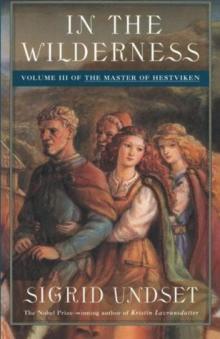 In the Wilderness
In the Wilderness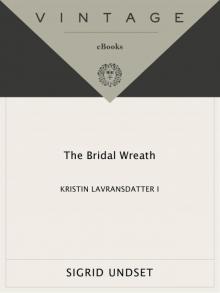 The Bridal Wreath
The Bridal Wreath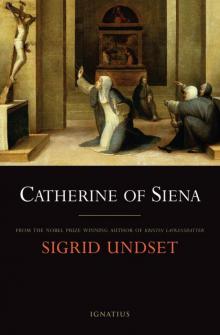 Catherine of Siena
Catherine of Siena Marta Oulie: A Novel of Betrayal
Marta Oulie: A Novel of Betrayal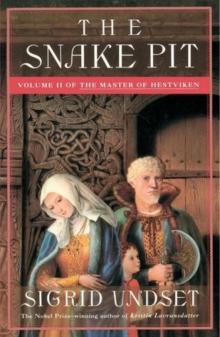 The Snake Pit
The Snake Pit The Axe
The Axe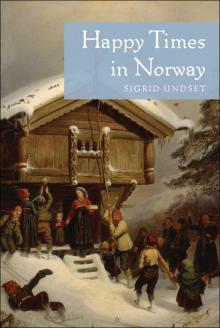 Happy Times in Norway
Happy Times in Norway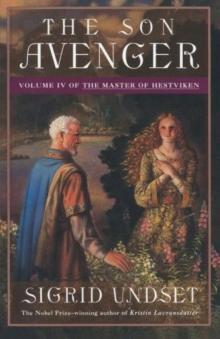 The Son Avenger
The Son Avenger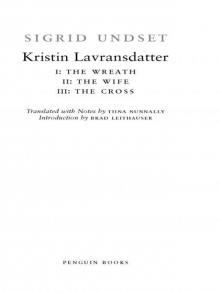 Kristin Lavransdatter
Kristin Lavransdatter